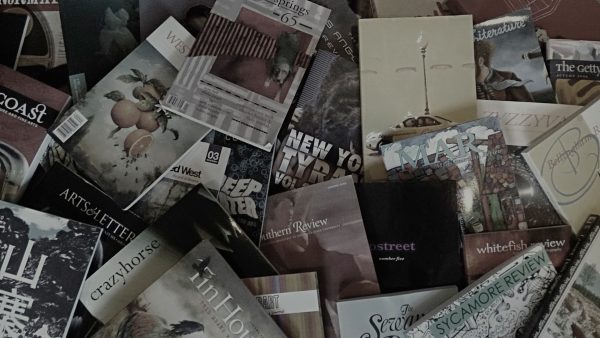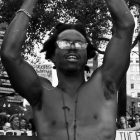The Best Short Story I Read in a Lit Mag This Week: “The School Bus Driver” by Souvankham Thammavongsa

The majority of love triangle narratives I’ve encountered focus primarily on how the triangle begins and ends. Throughout “The School Bus Driver” (Noon), Souvankham Thammavongsa asks how a love triangle can continue working for so long.
Thammavongsa opens the piece with a short scene of a married couple—Jai and Kheo—looking at pictures of a recent vacation to their birthplace of Laos, in which they were accompanied by Frank, Kheo’s manager at a coffee shop. The protagonist, Jai, flips to a picture of his wife, Kheo, in a bikini.
This bikini must have been Frank’s encouragement. He was in almost every one of these photos, smiling, or the one behind the camera.
“Oh, Frank, he’s such a goofball,” she said, giggling, trying to make light of the whole thing…
The school bus driver (Jai) thought his wife looked odd in these vacation pictures. Her black hair was set in big soft curls. She looked like a child’s doll: blue eyelids, long artificial eyelashes, pink round rosy cheeks, and red lipstick. She would never, on her own, make herself like this.
Notice how Thammavongsa captures Jai’s perspective on the matter through his voice. The bikini “must” have been Frank’s idea. “She would never, on her own, make herself like this.” While Jai trusts Kheo—a virtue key to any relationship—his trust isn’t endearing. It’s a bit condescending, stemming from a disdain over what she is doing, and even more, a disbelief in who she is becoming. Further complicating matters, what he can’t believe is this: that his wife might be cheating on him.
Thammavongsa develops this further by showing other ways in which Jai reasons away reality, when Frank begins driving Kheo home from work every night—arriving increasingly later than usual.
When the school bus driver (Jai) thought about how things used to be, he would remember what his wife used to smell like when she first worked there, a bit like burnt coffee beans. He had to admit to himself she seemed happier now about not relying on public transit. When he thought about it more, he thought she smelled of cigars. Frank’s cigars. The scent was a bit metallic and dusty. Frank probably smoked in that car. That’s how the smell got all over her like that.
Where before Jai’s perspective of his wife made his character less sympathetic, here Thammavongsa draws him more generously. Though he might not understand the changes his wife is making, he’s not so self-absorbed that he doesn’t appreciate the intricacies of her smell. More importantly, he wants her to be happy, even if what’s making her happy threatens him.
Love triangles ask us to pledge our allegiance to one corner over another; done well, a reader’s allegiance will shift back and forth between corners, with every scene bringing up new reasons to root for one match over another. One of the biggest shifts in the story happens when Frank comes over to Jai’s house and retreats with Kheo into their bedroom, locking the door, right in front of Jai.
“Why don’t you want me to have any friends!” his wife said, when he asked her about what happened in the bedroom with Frank. He hated arguments. He would do anything to avoid them. He had thought of forgetting this whole episode, but it was more than once. He didn’t want to be seen as spineless or, worse, not caring. When he tried to protest, to say something, Frank stepped in and said,“Be cool about this,” his red face sweaty, his white patches of hair damp after coming out of the bedroom with her.
It’s no surprise that Frank is bold in his indiscretion; what baffles Jai is how direct Kheo is in lying to him. This paves the way for Thammavongsa’s penultimate move, tying in how cultural misunderstandings can make trusting people like Jai ripe for exploitation. Notice this interaction after Jai again questions Kheo and Frank’s relationship.
“People form this kind of friendship in this country, Jay,” she said.
It took him a few seconds to realize his own name was now Jay. The beginning of a name like Jason. He thought she was talking about someone else, or to someone else…His name was Jai. He wanted to remind her. It means heart in Lao! He wanted to yell. But then she would remind him how men in this country do not raise their voices to women. Or remind him to practice his English…
“That’s just the way things are here,” she said. If he was going to live here, he had to learn to adapt and fit in and not be so uptight. “Be cool,” she said. Her English perfect, sounding just like Frank.
Denial is a powerful form of trust, so powerful it can make clear facts, laid out in plain sight, seem absolutely absurd. Thammavongsa leaves us to imagine that this strange triangle, now established as normal, will continue indefinitely—all three parties doing their part to make certain it stands.



